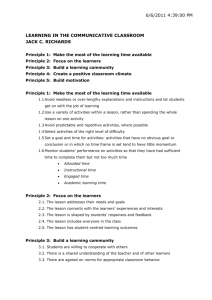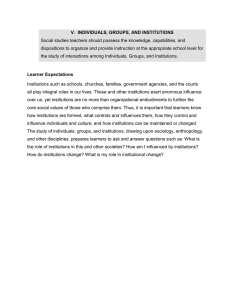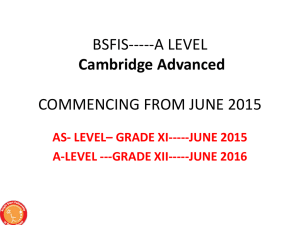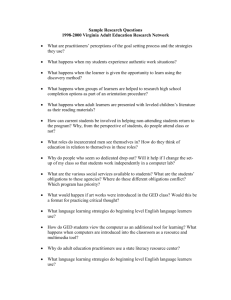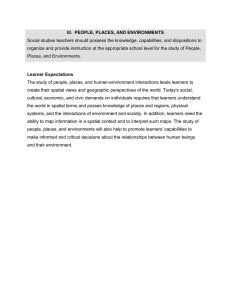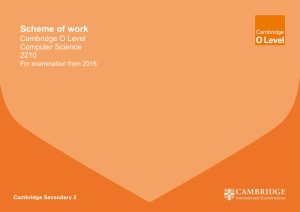Nury Supriyanti rta
advertisement
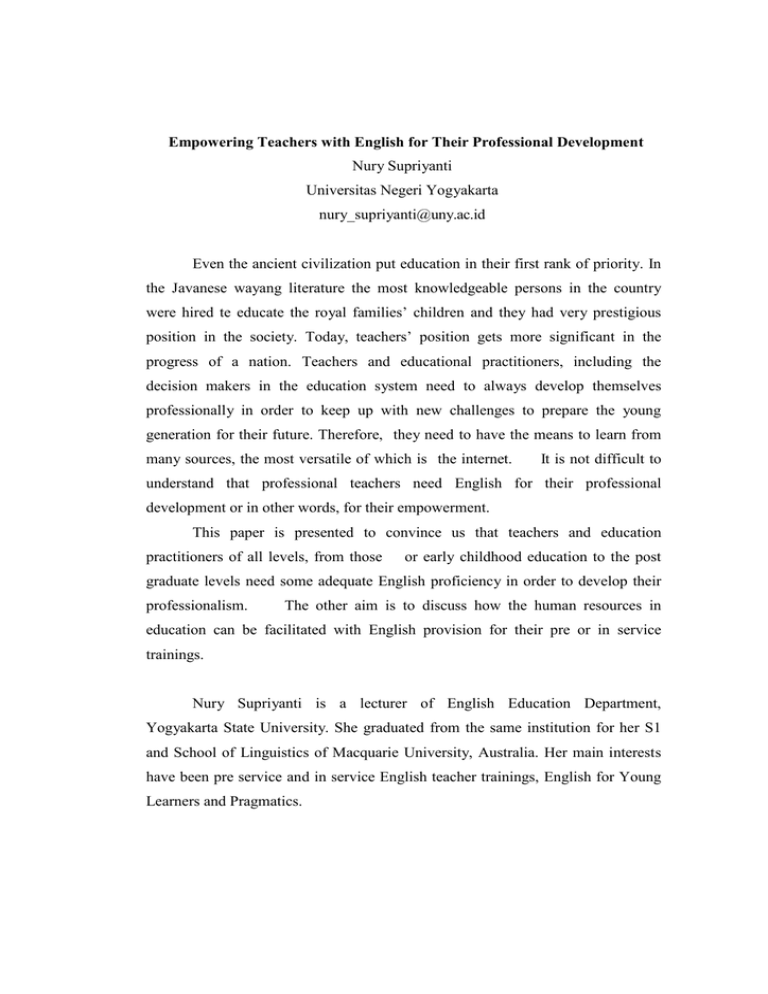
Empowering Teachers with English for Their Professional Development Nury Supriyanti Universitas Negeri Yogyakarta nury_supriyanti@uny.ac.id Even the ancient civilization put education in their first rank of priority. In the Javanese wayang literature the most knowledgeable persons in the country were hired te educate the royal families’ children and they had very prestigious position in the society. Today, teachers’ position gets more significant in the progress of a nation. Teachers and educational practitioners, including the decision makers in the education system need to always develop themselves professionally in order to keep up with new challenges to prepare the young generation for their future. Therefore, they need to have the means to learn from many sources, the most versatile of which is the internet. It is not difficult to understand that professional teachers need English for their professional development or in other words, for their empowerment. This paper is presented to convince us that teachers and education practitioners of all levels, from those or early childhood education to the post graduate levels need some adequate English proficiency in order to develop their professionalism. The other aim is to discuss how the human resources in education can be facilitated with English provision for their pre or in service trainings. Nury Supriyanti is a lecturer of English Education Department, Yogyakarta State University. She graduated from the same institution for her S1 and School of Linguistics of Macquarie University, Australia. Her main interests have been pre service and in service English teacher trainings, English for Young Learners and Pragmatics. Introduction Education must have always been the centre of attention in the life of a nation. Therefore, nobody needs to question why there has always been a lot of time and energy spent for educating the young generation of a nation. A nation’s future is determined by how well it has struggled with contraints and problems such as wars which make education difficult to be provided to the young generation. The life of a nation in its history has often gone up down, but it has always been education that help it rise again. The human resources of education are teachers so they have been the most crucial part of the discussion. Teachers play the role in providing education for the young generation of a nation. The most important human resources in education, however, are not themselves powerful party in playing their role. They do not have authority in managing themselves. They are part of the whole education system which heavily depend on how the political system manage them. If the system is good and understands the teacher’s role in sustaining the nation, the possibility of having good system in managing teacher will be greater. Therefore, the establishment of the political system in a nation should inherently have the educational vision in it. It means that those who run the country should be those who understand the meaning of education for their country. The failure to get them will certainly lead to the negligence of a good education system. Even in a country with good education system educational challenges have never ended. It is due to the fact that the changing world of teaching does exist. The increasing complexity of the environment in which teacher work and the demand placed upon them by the society is real.Teachers today need to equip their students with a wide range of abilities, knowledge and skills that they will require to take their place in the world that undergoes constant evolution. Therefore, it cannot be avoided that more competence-centered approaches to teaching Teachers’ role Teachers are not only responsible for the implementation of the curruculum, they are also in charge of defining and refining it. The interpretation and the transformation of the curriculum which then are put in the classroom practice are also done by the teachers. In short, what students learn in the classroom is determined by what teachers think about the curriculum. We can no longer argue that teachers are the ultimate key to educational change and improvement. Teacher Professional Development The claim that teachers are professional means that that they are those whose work involves performing a certain function with some degree of expertise must be followed by their professional development. Professional development for teachers can be defined as the need for teachers to develop themselves Taking Ur’s ( 2002) definition on professionalism of English teachers, we can learn what it means to be professional and it is applicable for teachers of other subjects. Teachers who are professional are those who : 1. have an identifiable community whose members are interested in interaction with one another for the sake of learning and for the enjoyment of exchanging experiences and ideas with sympathetic colleagues 2. are committed to teaching certain standard of performance and we are aware of the responsibility toward our learners and their learning. 3. publish for communicating innovatory ideas, whether theoretical or practical, to one another and to the public at large, through in house seminars, national or international conferences, journals, or books 4. learn not just teach continually about our subject matters, about their teaching method and about many other things that make them better educated and therefore better educators, they read, they listen, they reflect and they discuss. 5. are autunomous because nobody else can tell them what to do, they themselves are responsible for maintaining professional standards. In principle, therefore, a professional body should set the requirements for accreditation at different levels and should act as ‘gatekeeper’, ensuring that teaching is not performed by illqualified amateur. 6. are responsible for training new teachers because who have the right and responsibility to organize courses and teaching the next generation of practitioners, whether through school based, college based or university based courses. It has been widely recognized that the environment in which teachers do their jobs is becoming more complex everyday. Society has also been placing high demands on teachers in order to take their place in a world constantly changing. They have to struggle very hard to equip learners with a wide range of skills needed to face the world where the learners will live which will be more sophisticated than the world the teachers themselves live. This will be the lives that the teachers themselves have never encountered nor even imagined. A good example of this is the world related to the technology the world has. The Role of English In doing their professional development teachers need the tool which is the language used in providing and exchanging information world wide. Of course there are other languages but due to the users of the activity, English will always be cheaper and accessible to everyone. Today, professional development which has been discussed by experts is that which could be done on line. Information technology plays its significant role in providing information to anyone in most convenient and cheaper way whether it is done in group or individually. In assessing the information the most practical language is English. Therefore, having a good command in English is a must for anyone who needs information on line. Equipping teachers with English Looking at how how significant is professional development for a teacher’s long life career and how influential it is for the education of the nation, providing teachers with English should be done as part of the whole training plan for the teachers. The training design for teachers should include the policy that English is there in the plan to be developed so that even in their teacher training days, the future teachers are already familiar with English. Therefore, the need to improve the English provision should start even long before young people decide to take a teaching career as their profession. General Education The education for all the young generation in Indonesia needs to be more serious about English provision in schools. It is because we cannot deny the fact that they need English more than their previous generation. People may have put forward this idea of providing our generation with this international language. In this paper however, I would emphazise more on the way how it should be done. It should be started fundamentally from the philosophy that communication is the most important thing that should be taken care of. In learning how to communicate locally, regionally and internationally with other people, we focus on the languages needed to do so without being bothered with which and whose languages they are. We need to focus on the fact that we need the languages as tools for communication. In trying to change the people’s mindset about learning a foreign language, a policy needs to be made on how Indonesian children and adults view English learning as something ordinary, that it is not an exclusive thing to do. The question might be how Indonesian children and adults can see English learning as their need like the need to learn new technology. Therefor, the English teachers have the resposibilty to create the atmosphere so that the notion is established and developed. The adoption of the literacy education in which each level of education is assigned different aims in teaching the language will make it clear that the learning of English is an on going process. Students, teachers, education practitioners and policy makers should be made equally aware that English is part of the basic training teachers should have. Pre Service Training In this education stage, English provision should be taken more seriously. Providing students who will be future teachers should be done by design. Lack of sound program has caused teacher training institutions to spend useless time and energy on giving English to the students who are future teachers. It is common that English is put in the early semester in universities ranging from 2 to 4 credits. Since it is not taken seriously the provision is mostly ineffective. The syllabus is not well prepared or even is only up to the teachers what kind of English they want to teach. Some universities or teacher training might base the syllabus on TOEFL courses which might not be in line with the demand for the skill of being able to access information. If we look at the English instructors who teach English in the teacher training institutions we may also see that they are not specifically recruited without any particular requirements. English instructors with limited time and no guidelines will certainly end up in ineffective teaching. Instructors for the English provision in teacher training institutions should also be equipped with well designed syllabus so that they also know what is expected from them. It would also be more effective if the policy is started from the national level such as that English is included as one of the main graduates’ competences to be mastered by those leaving teacher training programmes. In Service Training Training providers of teachers today need to consider some English training for teachers. Since it is already well understood that the government is responsible for providing and facilitating teacher professional development, the policy should start somewhere from above. It can be started from the teacher recruitment in the national level. Some privately established institutions have already included some English mastery for teacher recruitment. This policy has given the idea that having English means having better opportunities for better careers. Conclusion The need of English for teachers of all levels and all subjects whether in schools or other education institutions is not only for their self professional development. It will determine the quality of their teaching which will , in turn, shape the future generation. Professional teachers will also train other future teachers, therefore, the domino effect is obvious here. It is therefore, the English provision to teachers should be done by design and prepared long before a person decides to be a teacher. The training of English then can be designed from the general education, in the pre-service training and in the in-service training. The training of English should be supported by educational policies from the government through all levels and all aspects. If this can be implemented the hope to have professional teachers who are autonomous in developing themselves will not be a dream for us. In turn, we will have quality human resources in our education which means better results in education and of course better lives for the whole nation. References Richards, Jack C. and Renadya, Willy A. (2002). Methodology in Language Teaching An Anthology of Current Practice. Cambridge: Cambridge University Press Richards, Jack C and Farrell, Thomas S.C. (2005) Professional Development for Language Teachers, Strategies for Teacher Learning. Cambridge: Cambridge University Press .
